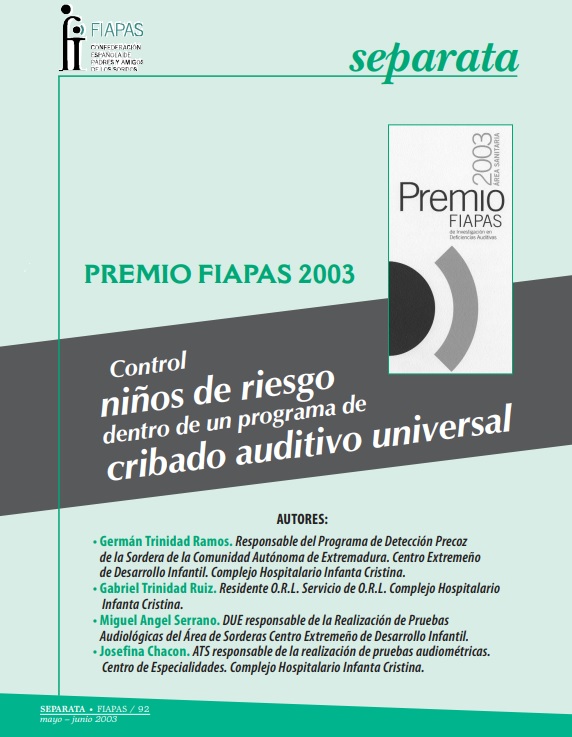Award-winning work
CONTROL OF CHILDREN AT RISK WITHIN A GLOBAL HEARING SCREENING PROGRAMME
Late-onset deafness, which accounts for 20%, the control of a global screening programme with otoemissions, and the existence of central disorders not identifiable by electrophysiological procedures make it advisable to monitor children with risk indicators.
The Deafness Area of the Extremadura Centre for Child Development, Infanta Cristina University Hospital Complex in Badajoz, performed the otoemissions test on 854 children with risk factors who are monitored every 6 months at the ENT clinic to check the normal development of spoken language and its comprehension through an audiological survey, signalling speech-audiometry, infant tonal audiometry and, if necessary, auditory evoked potentials.
Global hearing screening has been shown to be effective in identifying neonatal hearing loss. Central lesions may give normal electrophysiological test results. The audiological survey avoids having to perform more sophisticated examinations in most cases, providing a complete view of auditory integrity.
A child with severe deafness present at birth does not receive sound stimuli and will not acquire spoken language if proper procedures are not used. Therefore, if diagnosed and treated within the first few months, adverse effects due to lack of auditory stimulation and lack of language will be avoided.
Likewise, when they do not yet master spoken language, they have a less serious undiscovered deafness when they arrive at school where the communicative conditions are not as personalised as in the family environment and where unknown concepts for the child are to be introduced, they suffer learning problems and failure at school that might have been avoided had the problem been known and the existing, effective solutions had been adopted.
Finally, if children have a more or less significant intellectual deficit and also have undiscovered deafness, by not taking adequate measures for the hearing loss, the stimulation of their intellectual deficit will be delayed, blaming the overrated severity for their deficit because the accompanying sensory deficit is unknown. These children are more easily diagnosed when they are a few months old than they when they are several years old, which is when they usually arrive for audiological visits.
Reference: Trinidad et al. (2003): “Control of children at risk within a global hearing screening programme”. FIAPAS Journal, May-June 2003, No. 92, FIAPAS Supplement.
